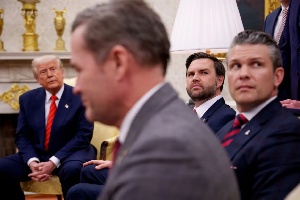- Home - Entertainment
- Lifestyle News
- Year In Review
- Music News
- Entertainers
- Entertainment Archive
- Entertainment Photos
- Jokes
- Entertainment Headlines
- Ameyaw Debrah
- Brown GH
- Celebrities Buzz
- GH Base
- Ghana Celebrities
- Gh Gossip
- GH Page
- GH Splash
- Hot Gossip GH
- YEN
Television of Tuesday, 25 March 2025
Source: www.ghanawebbers.com
Disdain for Europe in US Signal chat horrifies EU
A top European diplomat reacted to a recent US security chat. He described the disdain for European allies as "horrific" but not surprising. This chat was revealed late on Monday, European time.
Atlantic magazine editor-in-chief Jeffrey Goldberg accidentally joined the discussion. The chat focused on planned strikes against Houthi rebels in Yemen. Goldberg later made the exchange public.
In the chat, Vice-President JD Vance noted that only 3% of US trade goes through the Suez Canal. In contrast, 40% of European trade relies on it. He and Defence Secretary Pete Hegseth complained about European "free-loading."
This security breach has caused a stir in the US. Democrats are calling for Hegseth's resignation over his comments.
European leaders felt "sick to their stomach," according to an EU official. They spoke anonymously due to sensitive US-European relations.
Vance previously shocked officials at a Munich Security Conference last month. He criticized Europe for misplaced values like protecting abortion clinics and censoring speech online.
The leaked chat highlights tensions between Europe and the Trump administration. Many Europeans now doubt they can rely on the US as their ally, especially with Russia's resurgence.
Since World War Two, Western Europe has depended on US security and defense support. However, this reliance frustrates the Trump administration, which views Europe as "freeloaders."
The US spends 3.7% of its GDP on defense. Meanwhile, many NATO partners have struggled to reach even 2%. Countries like Spain and Italy still haven't met this target but plan to soon.
Europe relies heavily on the US for intelligence and aerial defense capabilities. About 100,000 American troops stationed in Europe help deter potential aggressors.
Since the Cold War ended, Europeans have prioritized welfare over defense spending. The Trump administration questions why the US should cover Europe's defense needs.
In the leaked chat, National Security Adviser Michael Waltz expressed concern about Europe's naval forces. He stated that only the US could reopen shipping lanes in the Suez Canal.
Waltz suggested that if America restores navigation freedom at great cost, Europe should compensate them economically.
Europe is now discussing increasing its own defense spending publicly. This move aims to keep Donald Trump supportive while countering Russian aggression after Ukraine.
Trump's frustration with Europe is not new; he has long criticized low defense spending there. He also resented Europe's trade surplus with the US during his first term.
Imposing tariffs was one of Trump's initial responses to these issues. Recently, he threatened steep tariffs on European alcohol products while calling out alleged EU abuses against America.
EU officials Ursula von der Leyen and Maros Sefcovic visited Washington recently to prevent new tariffs from being imposed amid these tensions.
On defense matters, Trump has warned that he won't protect countries that don't pay their fair share. His candidate for NATO ambassador suggests Europeans should spend 5% of their GDP on defense.
Currently, the UK spends 2.3% of its GDP on military efforts and aims for 2.6% by 2027; France spends around 2.1%.
During the Cold War, a common enemy united Western nations against Soviet influence in Eastern Europe.
However, since then apathy towards NATO has grown in both Washington and Europe—especially after events like September 11th shifted focus toward Iraq and Afghanistan instead of European security concerns.
President Obama emphasized Asia as his foreign policy priority during his tenure.
Trump is not alone in criticizing Europe's reluctance to invest more in its own defenses.
However, he brings an ideological divide into play regarding social values—as highlighted by Vance’s remarks—and shows impatience toward resolving conflicts like Ukraine while favoring Russia's Vladimir Putin amidst rising threats perceived by Europe itself.











